Monthly Archives: February 2019

 Few things change a man as much as becoming a daddy. Yes, becoming a fiancé and husband are life changing events too, but when your beloved presents you with your first child…well you never forget how amazing that feels. For my oldest grandchild, Chris Petersen, this past year was that year…the most important year in his life. Chris went from being a a young man to being someone’s daddy, and it doesn’t get better than that amazing day, when that precious little girl finally arrived.
Few things change a man as much as becoming a daddy. Yes, becoming a fiancé and husband are life changing events too, but when your beloved presents you with your first child…well you never forget how amazing that feels. For my oldest grandchild, Chris Petersen, this past year was that year…the most important year in his life. Chris went from being a a young man to being someone’s daddy, and it doesn’t get better than that amazing day, when that precious little girl finally arrived.
Chris and his fiancée are doing everything they know to do to protect and nurture their little girl. One of those decisions was to protect her from over exposure to the internet, and so my readers will have to use their imaginations concerning my little great granddaughter. I can say that she and her mommy have enriched Chris’ life beyond anything he could have imagined, and I can see the love he has for them in his eyes every time he looks at them. For his parents, and his grandparents, it is such a beautiful change to see. Chris has grown so much. The “wild child” of his youth is long gone, and he is a settled family man, who wants nothing more than to go home after work to be with his girls. They are his life and his joy. He loves them more that he does himself, and he feels so blessed that they are in his life, and every parent can fully understand that. There is nothing like being a parent. It’s a feeling that has no equal.

 When a child is little, you simply do not know what they will become, but it is a good bet that at some point, most will become parents. Chris has reached that place, and these days the greatest part of his life is his fiancée, his baby girl, and the simple word…Dada!! Who could have thought that such a simple little word could create such joy in a person. Of course, every parent knows the joy of your baby’s first words, usually mama and dada. They are forever precious. Today is Chris’ 23rd birthday. Happy birthday Chris!! Have a great day with your girls!! We love you!!
When a child is little, you simply do not know what they will become, but it is a good bet that at some point, most will become parents. Chris has reached that place, and these days the greatest part of his life is his fiancée, his baby girl, and the simple word…Dada!! Who could have thought that such a simple little word could create such joy in a person. Of course, every parent knows the joy of your baby’s first words, usually mama and dada. They are forever precious. Today is Chris’ 23rd birthday. Happy birthday Chris!! Have a great day with your girls!! We love you!!
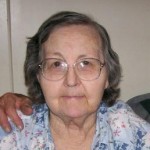
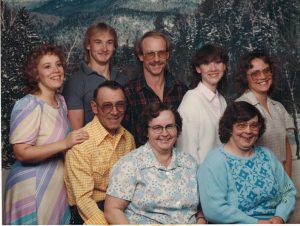 My mother-in-law, Joann Schulenberg, was all about family. She spent her married life as a stay-at-home mom, but that did not mean that she didn’t work. Taking care of six children is simply no picnic. Between cooking meals for everyone, cleaning, canning food, sewing clothes, and knitting things for them, she was a pretty busy lady. My mother-in-law was always the most comfortable raising her children in the country. She felt like it was too much out of her control in town. She worried about the traffic, and the people around, and about the kids running off while playing. She just needed the control of the country to give her peace of mind.
My mother-in-law, Joann Schulenberg, was all about family. She spent her married life as a stay-at-home mom, but that did not mean that she didn’t work. Taking care of six children is simply no picnic. Between cooking meals for everyone, cleaning, canning food, sewing clothes, and knitting things for them, she was a pretty busy lady. My mother-in-law was always the most comfortable raising her children in the country. She felt like it was too much out of her control in town. She worried about the traffic, and the people around, and about the kids running off while playing. She just needed the control of the country to give her peace of mind.
So the family lived in the country for most of the years that the kids were growing up. It wasn’t until 1989 that the family, now of just three at home, moved into Casper to stay. It’s funny that Joann, who had always hated the traffic, the noise, and the activity of city life, suddenly loved to watch the cars go by on the busy street on which they lived. She liked not having to go so far into town for groceries and such. She liked having visitors come by, because suddenly it wasn’t too far for them to go. Like me, she discovered the convenience of city life. Those long drives into town were the first thing I found my self happy to do without. I’m sure my mother-in-law did too…especially on the icy winter roads around here.
By 1996, my mother-in-law became a great grandmother for the first two times. She got a great birthday present in her first great grandchild, Christopher Petersen, who made his grand entrance on her 65th birthday. It was a treat that she had wanted since her mother was also privileged to receive, and never thought she would get. Then the very next day, she god something else she never thought she would get…a Leap Day Great 
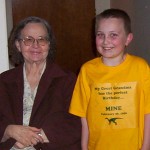 Grandbaby…Shai Royce. Needless to say we were quite busy those two days. She has gone on to have 11 grandchildren, 13 great grandchildren, and 1 great great granddaughter. Her family has sure grown, and while she has never met her great great granddaughter, I know she would love her as much as we all do. She found out about her just days before her passing, and she was very excited about it. I was glad she got to know, because family was always very important to her. Today would have been my mother-in-law’s 88th birthday. Happy birthday in Heaven Mom. We love and miss you very much.
Grandbaby…Shai Royce. Needless to say we were quite busy those two days. She has gone on to have 11 grandchildren, 13 great grandchildren, and 1 great great granddaughter. Her family has sure grown, and while she has never met her great great granddaughter, I know she would love her as much as we all do. She found out about her just days before her passing, and she was very excited about it. I was glad she got to know, because family was always very important to her. Today would have been my mother-in-law’s 88th birthday. Happy birthday in Heaven Mom. We love and miss you very much.
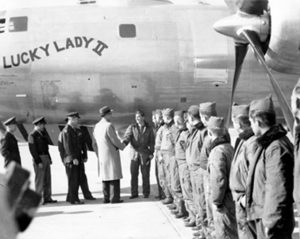 When flight first began, I seriously doubt that anyone had any idea how far it would go. Many people said, “If God had wanted us to fly, He would have given us wings!” Of course, wings can be added…if you know how to add them. The Wright brothers figured out how to add those wings, and how to make them fly. Nevertheless, any kind of long distance fight was still far in the future, back then.
When flight first began, I seriously doubt that anyone had any idea how far it would go. Many people said, “If God had wanted us to fly, He would have given us wings!” Of course, wings can be added…if you know how to add them. The Wright brothers figured out how to add those wings, and how to make them fly. Nevertheless, any kind of long distance fight was still far in the future, back then.
Then, on July 25, 1909, Louis Blériot took off from a field in France, and flew his flimsy monoplane northward for half an hour, and landed near Dover Castle in England. The flight…at the time, daring beyond belief…caused a sensation in Britain. No one thought it could be done, and much less that a mere 40 years later, a plane would actually make a non-stop around the world trip…successfully. Nevertheless, forty years later, Captain James G. Gallagher and a 13-man crew took off from Carswell AFB, Texas, in a B-50 bomber named Lucky Lady II. Four days later they landed back at Carswell. This achievement, the first nonstop flight around the world, also stirred the public imagination.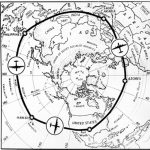
Neither event involved a major breakthrough in technology, but each was significant for other reasons. Blériot’s flight lasted a mere 37 minutes. In several demonstration flights in France during the previous year, Wilbur Wright had stayed aloft much longer. Blériot was the first to use a combination of hand/arm-operated joystick and foot-operated rudder control, that is in use to the present day, for the basic format of aerodynamic aircraft control systems. Blériot was also the first to make a working, powered, piloted monoplane. In 1909 he became world-famous for making the first airplane flight across the English Channel.
Lucky Lady II took off from Carswell Air Force Base in Fort Worth, Texas. A B-50 Superfortress, Lucky Lady II 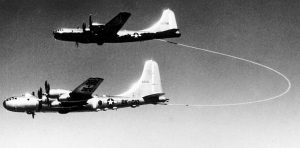 flew the first nonstop round-the-world flight. The aircraft averaged 249 miles per hour on its 23,452 mile flight. The Lucky Lady II was refueled four times in the air by B-29 tanker planes and on March 2 returned to the United States after 94 hours in the air. It was a record breaking flight. Of course, the record would not last forever. In December 1986, Voyager, a lightweight propeller plane constructed mainly of plastic, landed at Edwards Air Force Base in Muroc, California, having completed the first global flight without refueling. Flight will most likely never stop improving.
flew the first nonstop round-the-world flight. The aircraft averaged 249 miles per hour on its 23,452 mile flight. The Lucky Lady II was refueled four times in the air by B-29 tanker planes and on March 2 returned to the United States after 94 hours in the air. It was a record breaking flight. Of course, the record would not last forever. In December 1986, Voyager, a lightweight propeller plane constructed mainly of plastic, landed at Edwards Air Force Base in Muroc, California, having completed the first global flight without refueling. Flight will most likely never stop improving.
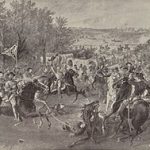
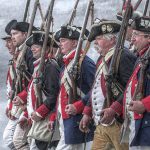 You have probably heard of the famous “Shot Heard Round the World?” It is a phrase referring to several historical incidents, the assassination of Archduke Franz Ferdinand of Austria in 1914, and particularly the beginning of the American Revolutionary War in 1775. Tensions had been mounting because colonists were frustrated as Britain forced them to pay taxes. The big problem was that they did not give them any representation in the British Parliament. The colonists were fair minded people and this flew in the face of that fairness. They rallied behind the phrase, “no taxation without representation.” The first shots rang out on the morning of April 19, 1775 in Lexington, Massachusetts.
You have probably heard of the famous “Shot Heard Round the World?” It is a phrase referring to several historical incidents, the assassination of Archduke Franz Ferdinand of Austria in 1914, and particularly the beginning of the American Revolutionary War in 1775. Tensions had been mounting because colonists were frustrated as Britain forced them to pay taxes. The big problem was that they did not give them any representation in the British Parliament. The colonists were fair minded people and this flew in the face of that fairness. They rallied behind the phrase, “no taxation without representation.” The first shots rang out on the morning of April 19, 1775 in Lexington, Massachusetts.
At the Battle of Bunker Hill, colonial officer William Prescott ordered, “Do not fire until you see the whites of their eyes!” His troops had the courage and discipline to hold their fire until the enemy was near, an early sign that the rag-tag American army had a chance at defeating the well-trained, well-armed British troops. Congress chose George Washington as commander and chief of America’s armed forces. The Battle of Saratoga was the first great American victory of the war and is widely believed to have been the turning point that led America to triumph over Britain. The Treaty of Paris was signed in 1783, and at last, Great Britain acknowledged America’s 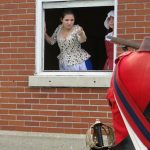 independence. The treaty established a northern boundary with Canada and set the Mississippi River as the western boundary. In all 217,000 men took part in the war, and 4,435 lost their lives. Most people know all or at least most of this…or at least have read about it.
independence. The treaty established a northern boundary with Canada and set the Mississippi River as the western boundary. In all 217,000 men took part in the war, and 4,435 lost their lives. Most people know all or at least most of this…or at least have read about it.
However, you might not know that the Revolutionary War almost started early thanks to Sarah Tarrant, a nurse with a fiery temper who lived in Salem, Massachusetts in 1775, hurled insults at the retreating redcoats aimed his musket at her, and she dared him, “Fire, if you have the courage, but I doubt it.” No shots were fired, and the British, having found no weapons, left the town. Had he shot her, the war would have started earlier than it did.
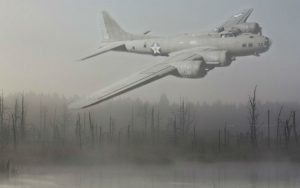
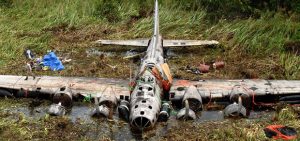 The Swamp Ghost began its very short career on December 6, 1941, one day before the Japanese attacked Pearl Harbor. The Swamp Ghost started out as B-17 Flying Fortress, 41-2446 (which is not a tail number, and indicated that the plane was a new purchase) and under that number it was delivered to the United States Army Air Forces (USAAF). Eleven days later, the bomber departed California for Hickam Field in Pearl Harbor, Hawaii. The plane and her crew were based at Wheeler Field in Wahiawa for a very short time, and flew patrol missions for the Navy until February 1942, when the Japanese Troops invaded Rabaul on New Britain and established a base. Of course, this was a threat to the rest of New Guinea and Australia. In response to the invasion, 41-2446 was ordered to Garbutt Field, Townsville, in Queensland, Australia. Swamp Ghost’s crew included Pilot Captain Frederick C. “Fred” Eaton, Co-Pilot Captain Henry M. “Hotfoot” Harlow, Navigator 1st Lieutenant George B. Munroe Jr, Bombardier Sergeant J.J. Trelia, Flight Engineer Technical Sergeant Clarence A. LeMieux, Radio Operator/Gunner Sergeant Howard A. Sorensen, Waist Gunner Sergeant William E. Schwartz, Waist Gunner Technical Sergeant Russell Crawford, and Tail Gunner Staff Sergeant John V. Hall. The only crew change would be Sergeant Richard Oliver, who replaced Bombardier Trelia after he became ill.
The Swamp Ghost began its very short career on December 6, 1941, one day before the Japanese attacked Pearl Harbor. The Swamp Ghost started out as B-17 Flying Fortress, 41-2446 (which is not a tail number, and indicated that the plane was a new purchase) and under that number it was delivered to the United States Army Air Forces (USAAF). Eleven days later, the bomber departed California for Hickam Field in Pearl Harbor, Hawaii. The plane and her crew were based at Wheeler Field in Wahiawa for a very short time, and flew patrol missions for the Navy until February 1942, when the Japanese Troops invaded Rabaul on New Britain and established a base. Of course, this was a threat to the rest of New Guinea and Australia. In response to the invasion, 41-2446 was ordered to Garbutt Field, Townsville, in Queensland, Australia. Swamp Ghost’s crew included Pilot Captain Frederick C. “Fred” Eaton, Co-Pilot Captain Henry M. “Hotfoot” Harlow, Navigator 1st Lieutenant George B. Munroe Jr, Bombardier Sergeant J.J. Trelia, Flight Engineer Technical Sergeant Clarence A. LeMieux, Radio Operator/Gunner Sergeant Howard A. Sorensen, Waist Gunner Sergeant William E. Schwartz, Waist Gunner Technical Sergeant Russell Crawford, and Tail Gunner Staff Sergeant John V. Hall. The only crew change would be Sergeant Richard Oliver, who replaced Bombardier Trelia after he became ill.
Because of the B-17’s long flying range, the Japanese control of Wake Island and Guam, and the Vichy government’s armistice with the Nazi government, 41-2446 island hopped nearly 5,700 detour miles to get to Townsville. They didn’t want to take a chance on running into enemy fighters, if they could help it. On February 22, 1942, nine B-17Es of the 19th Bombing Group were scheduled to take off for Rabaul. Unfortunately, this mission seemed doomed from the start, as nothing would go quite as planned. Out of the nine aircraft, four had to completely abort the mission due to mechanical problems. To further complicate matters, bad weather conditions made it difficult to see up in the air for those who were able to takeoff. Finally, poor visibility separated the five remaining in flight.
I would like to say that was all the problems they ran into, but there’s more. When 41-2446 was to drop its payload, the bomb bay malfunctioned. The crew had to go around for a second pass, where they managed a clear drop over their target. The Japanese were working hard to make this mission fail too. Japanese fire was intense and a flak round managed to punch a hole through the starboard wing of 41-2556. Fortunately for the crew, the wing didn’t detonate. While the crew hoped to make it to Fort Moresby, they were low on fuel. The dog-fight, had seen to that. They would have to land in New Guinea.
Captain Fred Eaton thought he was setting down the bomber in a wheat field, however, they actually landed wheels-up in the middle of Agaiambo swamp. The only good news in this horrific failure of a mission was that the crew was unscathed, except for one with minor cuts and scrapes. Now, they still had to get out of the swamp. It took two days of hacking their way through the razor-sharp kunai grass for the men to reach dry land. They ran into some locals who were chopping wood. The locals took them, horribly bitten by mosquitos and infected with malaria, to their village. After a night of rest, they traveled downriver in canoes, where they were handed over to an Australian magistrate, and eventually arrived at Port Moresby on April 1…thirty six days after their crash. After a week in the hospital, the men returned to combat, but their plane did not. After 41-2446’s crash, Captain Fred Eaton flew 60 more missions. Whenever these missions would take him over the crash site, he would circle it and tell his new crewmembers the story of what happened. I suppose it was therapeutic to re-live the amazing escape from the Agaiambo swamp. This was where the plane’s legend was born. After Eaton returned home, 41-2446 slipped from the public eye for nearly three decades.
Then, in 1972, some Australian soldiers happened upon the crash. After spotting the wreckage from a helicopter, they landed on the aircraft’s wing and found the plane semi-submerged, and strangely intact. The machine guns were in place, and even the coffee thermoses were intact. They nicknamed the plane, Swamp Ghost, and the name stuck. Thanks to warbird collector Charles Darby who included dozens of photographs in his book, Pacific Aircraft Wrecks, word spread in 1979 . Once the fad of recovering World War II aircraft really took off. Trekkers hiked into the site and began stripping the aircraft for keepsakes and sellable items. Despite the stripping, the aircraft structure itself remained remarkably intact, until it was removed from the swamp.
Alfred Hagen, a pilot and commercial builder from Pennsylvania, set his sights on Swamp Ghost and wanted to take it free it from the disintegration of the swamp. In November 2005, he obtained an export permit for the 
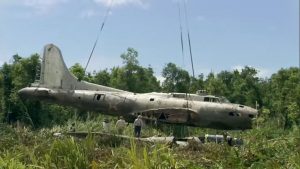 B-17 for $100,000. For four weeks they labored over the aircraft, dismantling it in order to ship it out of the country. The controversy over its removal halted the cargo before it could be shipped to the United States. Eventually, it was cleared for import and by February 2010 it arrived at the Pacific Aviation Museum at Pearl Harbor for display.
B-17 for $100,000. For four weeks they labored over the aircraft, dismantling it in order to ship it out of the country. The controversy over its removal halted the cargo before it could be shipped to the United States. Eventually, it was cleared for import and by February 2010 it arrived at the Pacific Aviation Museum at Pearl Harbor for display.
 Following her graduation from the dental program in October, 2017, my grandniece, Christina Masterson took a job as a dental office administrator doing insurance billing for the office. She worked there until just recently, when she took a job at Gleneagle Dental in that same position, while continuing to work as office administration at the other office on a part time basis. I’m sure the people at Christina’s old office were thankful to have her there, even if it was only part time. When you have someone who knows their job and does it well, you hate to lose them, so keeping them, even if it is only part time is a definite plus.
Following her graduation from the dental program in October, 2017, my grandniece, Christina Masterson took a job as a dental office administrator doing insurance billing for the office. She worked there until just recently, when she took a job at Gleneagle Dental in that same position, while continuing to work as office administration at the other office on a part time basis. I’m sure the people at Christina’s old office were thankful to have her there, even if it was only part time. When you have someone who knows their job and does it well, you hate to lose them, so keeping them, even if it is only part time is a definite plus.
Recently, Christina decided that the time had come for her to get a new to her car. She 
 chose a 2013 Ford Focus hatchback. Buying a new car is always a cool thing, especially for a 23 year old to get a such nice car for themselves. It’s an accomplishment to be proud of.
chose a 2013 Ford Focus hatchback. Buying a new car is always a cool thing, especially for a 23 year old to get a such nice car for themselves. It’s an accomplishment to be proud of.
It was also time for a change in roommates. Christina moved in with a girl who has a little boy. Christina loves kids, so it is a great arrangement. The fact that Christina has one whole floor to herself is a definite plus too. While she loves kids, there are just times when a girl needs her own space.

Christina has 6 half-siblings. She has 3 half-brothers, Bradon, Brycen, and Carter in Colorado, and 2 half-sisters, Raelynn and Anna; and a half-brother, Matthew here in Casper. She doesn’t get to see her half-siblings in Casper very often, due to the distance and the cost of traveling here, but this past summer, she was able to come for a visit. It was a joyous reunion for all of them, and while they wish she could come more often, they really had a great time while she was here. Her Dad and Step-mom, Rob and Dustie Masterson were so happy that she could make the trip, as they all miss her very much. Today is Christina’s 23rd birthday. Happy birthday Christina!! Have a great day!! We love you!!
 My brother-in-law, Ron Schulenberg, like all of the Schulenberg men I know, is a workaholic. If he isn’t at his job, he is working on something in his garage, or around the house. I’m fairly convinced that the Schulenberg men do not consider mechanic work to be work…no matter how hard it is and no matter how dirty and greasy they get. I guess it’s the same as I feel about writing or genealogy…they are intriguing and interesting, so they aren’t work. While the Schulenberg men would most likely find writing and genealogy boring, they do not consider tinkering around on a car boring at
My brother-in-law, Ron Schulenberg, like all of the Schulenberg men I know, is a workaholic. If he isn’t at his job, he is working on something in his garage, or around the house. I’m fairly convinced that the Schulenberg men do not consider mechanic work to be work…no matter how hard it is and no matter how dirty and greasy they get. I guess it’s the same as I feel about writing or genealogy…they are intriguing and interesting, so they aren’t work. While the Schulenberg men would most likely find writing and genealogy boring, they do not consider tinkering around on a car boring at  all. I guess we all have our own ideas.
all. I guess we all have our own ideas.
Ron also loves to go camping in the summer, which is one reason why he, like many people can’t wait for summer and the warmer weather. Even if you like winter, which I don’t think most people do, there comes a point in the long winter season, when everyone looks forward to summer and being able to get outside and do things. Ron has liked camping since he was a little kid, and he has never outgrown it, so he, his wife, Rachel and their son Tucker try to go just  about every other weekend of the summer. They also like to travel. and took a trip to New York a couple of years back. Their boys, Riley and Tucker had a great time. It was a great trip.
about every other weekend of the summer. They also like to travel. and took a trip to New York a couple of years back. Their boys, Riley and Tucker had a great time. It was a great trip.
Ron and his son, Tucker do lots of things together. Tucker loves to help his dad with whatever he is doing. It’s always nice to have a son who wants to learn from you, and that makes Ron’s relationship with Tucker very special. After their son Riley moved out, I think Ron and Tucker got even closer. Tucker missed his brother, but his dad is truly his hero. Ron is always there for Tucker. Today is Ron’s birthday. Happy birthday Ron!! Have a great day!! We love you!!
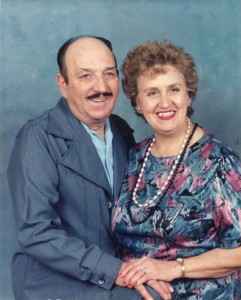
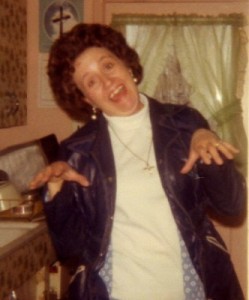 Time goes by so quickly, especially concerning the passing of a loved one. My mind just doesn’t want to wrap itself around the fact that it has been four years since my mom went to Heaven. I know that there are many people who have been without their parents much longer than I have, and they know exactly how I feel on this 4th anniversary of my mother’s graduation to Heaven.
Time goes by so quickly, especially concerning the passing of a loved one. My mind just doesn’t want to wrap itself around the fact that it has been four years since my mom went to Heaven. I know that there are many people who have been without their parents much longer than I have, and they know exactly how I feel on this 4th anniversary of my mother’s graduation to Heaven.
As I write this, I can think of so many things I would have loved to tell my mom, who was one of my biggest fans when it came to my writing. She loved the history stories, especially when it pertained to the family history. This year has been such a wonderful year for new and interesting finds, and it seems like I want to call her almost every day to tell her something new. And there are so many days I want to ask her about something I’ve discovered. Sadly, when we are young, we don’t realize just how important those family stories will become when we are older.
Mom, was always the bringer of the sunshine to our house, singing to us when we woke up, when we were sad, or when we were happy. They were usually little one or two line songs, but they said it all. She told us little bits and pieces of life with her siblings, and all the singing they did, giving us a glimpse of all the laughter and fun that was our grandparents house when all the kids were there. Mom was the middle child in a family of nine children, and that probably gave her a unique view of things. She got to participate in the fun things the older 
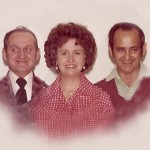 siblings are doing, and she was still young enough to enjoy the things the younger siblings were doing. Being the middle child, born between the only two boys, put her in a unique position too. She got in on some of the antics the boys got into…much like the three musketeers. Mom always had a fun-loving attitude, and that made life with Mom lots of fun. Today marks my mom’s 4th anniversary in Heaven. While we know that she is having the time of her life, we miss her very much. We love you Mom.
siblings are doing, and she was still young enough to enjoy the things the younger siblings were doing. Being the middle child, born between the only two boys, put her in a unique position too. She got in on some of the antics the boys got into…much like the three musketeers. Mom always had a fun-loving attitude, and that made life with Mom lots of fun. Today marks my mom’s 4th anniversary in Heaven. While we know that she is having the time of her life, we miss her very much. We love you Mom.

 My sister-in-law, Debbie Cook, has become a quilting fanatic. I’ve never made a quilt myself, but I guess it is really quite addictive. Like her daughter, Susan Griffith, I can’t understand the draw, because sewing is simply not my thing, and Susan says she can’t even sew a straight line., so we are on the same page there. Debbie has always been crafty though. She makes dish clothes and cross stitch items to sell at the craft fair that most towns hold, especially around Christmastime. She loves going to craft fairs, looking forward to it all year, which she comes by naturally, given the fact that her mom, Joann Schulenberg and her sister, Brenda Schulenberg had booths at the craft fairs for years. Even her dad, Walt Schulenberg got involved after he retired.
My sister-in-law, Debbie Cook, has become a quilting fanatic. I’ve never made a quilt myself, but I guess it is really quite addictive. Like her daughter, Susan Griffith, I can’t understand the draw, because sewing is simply not my thing, and Susan says she can’t even sew a straight line., so we are on the same page there. Debbie has always been crafty though. She makes dish clothes and cross stitch items to sell at the craft fair that most towns hold, especially around Christmastime. She loves going to craft fairs, looking forward to it all year, which she comes by naturally, given the fact that her mom, Joann Schulenberg and her sister, Brenda Schulenberg had booths at the craft fairs for years. Even her dad, Walt Schulenberg got involved after he retired.
Debbie is grandma to four grandchildren, Weston Moore, Jala Satterwhite, Easton Moore, and Kaytlyn Griffith. Over the years, she has picked all of them up after school, but these days it just her and Kaytlyn once a week. It nice for both of them, because it gives them a chance to hang out. They like to play board games. I don’t know who wins the most, but I expect that it gets competitive, because Kaytlyn is getting to that age, where she knows how all this works.
Debbie’s daughter, Machelle Moore told me of the time that her mom got her out of quite a jam. Machelle’s son, Easton had a hat, and he cut a hole in the middle of the front, so he could pull it over his face. Easton didn’t know the hat was made by Machelle’s mother-in-law, Easton’s other grandma, and they were quite upset that he had “ruined” the hat his grandma had so lovingly made. Debbie came to the rescue. She fixed it and that was quite the job!! Repair work is often much harder than making the original item. She did great though!!

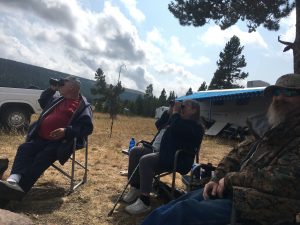 Machelle got a new dishwasher about a year ago and wanted to make a sign to put on the front of it to tell if the dishes were clean or dirty. Easton figured out that the front of it was magnetic. On the next family camping trip, Machelle told her mom that she needed a magnet cross-stitched sign that says clean on top, and when flipped, it says dirty. It sure comes in handy!! Both of the girls feel very blessed to have their mom so close by. Today is Debbie’s birthday. Happy birthday Debbie!! Have a great day!! We love you!!
Machelle got a new dishwasher about a year ago and wanted to make a sign to put on the front of it to tell if the dishes were clean or dirty. Easton figured out that the front of it was magnetic. On the next family camping trip, Machelle told her mom that she needed a magnet cross-stitched sign that says clean on top, and when flipped, it says dirty. It sure comes in handy!! Both of the girls feel very blessed to have their mom so close by. Today is Debbie’s birthday. Happy birthday Debbie!! Have a great day!! We love you!!
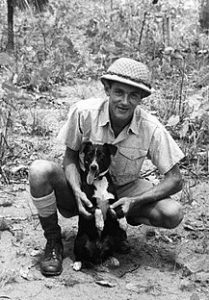 Gunner was a stray male Kelpie, born in August 1941, who became notable for his reliability to accurately alert Allied Air Force personnel that Japanese aircraft were approaching Darwin during the Second World War. Gunner was six months old when he was found whimpering under a destroyed mess hut at Darwin Air Force base where he suffering a broken leg on February 19, 1942, following the first wave of Japanese attacks on Darwin.
Gunner was a stray male Kelpie, born in August 1941, who became notable for his reliability to accurately alert Allied Air Force personnel that Japanese aircraft were approaching Darwin during the Second World War. Gunner was six months old when he was found whimpering under a destroyed mess hut at Darwin Air Force base where he suffering a broken leg on February 19, 1942, following the first wave of Japanese attacks on Darwin.
Gunner was taken to a field hospital, but the doctor insisted he could not fix a “man” with a broken leg without knowing his name and serial number. The doctor repaired and plastered his leg after the air force personnel replied that his name was “Gunner” and his number was “0000”. Gunner entered the airforce on that day. It might have been unofficial, but only is the way he was “drafted.” Gunner’s Air Force career was very real. Leading Aircraftman Percy Westcott, one of the two airmen who found Gunner, took ownership of him and became his master and handler. Gunner was badly shaken after the bombing and quite skittish, but being only six months old he quickly responded to the attention of the men on base.
About a week later, Gunner first demonstrated his remarkable hearing skills. The men were working on the airfield, when Gunner became agitated. He started to whine and jump. A little while later, the sound of approaching airplane engines was heard by the airmen. Suddenly, a wave of Japanese raiders appeared in the skies above Darwin and began bombing and strafing the town. Somehow…Gunner knew. Two days later, Gunner became agitated again, and not long afterwards came another air attack. In the months that followed, the same pattern played out every time an attack occurred. Long before the sirens sounded, Gunner would become agitated and head for shelter. Because of Gunner’s amazing hearing he was able to warn air force personnel of approaching Japanese aircraft up to 20 minutes before they arrived and before they showed up on the radar. Gunner was never agitated when he heard Allied planes taking off or landing….just the enemy aircraft. Somehow Gunner could differentiate the sounds of Allied and enemy aircraft. He was so reliable that Wing Commander McFarlane gave approval for Westcott to sound a portable air raid siren whenever Gunner’s 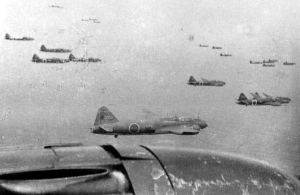 whining or jumping alerted him. Before long, there were a number of stray dogs roaming the base. McFarlane gave the order that all dogs be shot, with the exception of Gunner. They couldn’t afford any distractions.
whining or jumping alerted him. Before long, there were a number of stray dogs roaming the base. McFarlane gave the order that all dogs be shot, with the exception of Gunner. They couldn’t afford any distractions.
Gunner became such a part of the air force that he slept under Westcott’s bunk, showered with the men in the shower block, sat with the men at the outdoor movie pictures, and went up with the pilots during practice take-off and landings. When Westcott was posted to Melbourne 18 months later, Gunner stayed in Darwin, looked after by the RAAF butcher. It is unknown what happened to Gunner after the war, but he was a most amazing dog.

